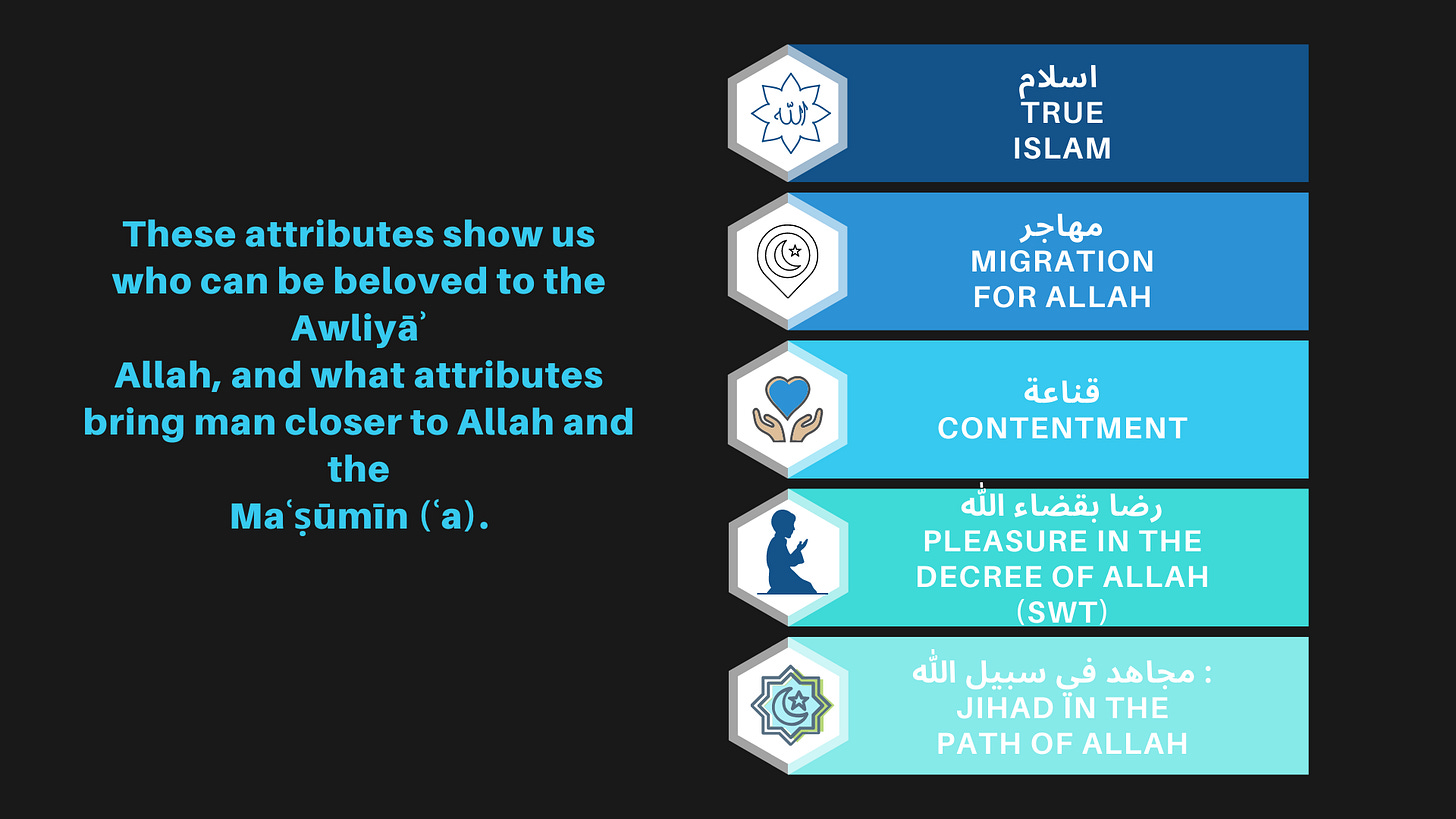Saying 43 - Khabbāb b. Aratt
Have you heard of one of the devotees of the Amīr al-Muʾminīn (ʿa), by the name of Khabbāb b. Aratt? In this saying, Imām (ʿa) prays for Khabbāb and enlists 5 of his praiseworthy qualities.
Thank you for having subscribed to Study Nahj al-Balāghah. We will endeavour to send an issue every Sunday. If this issue gets diverted to your spam folder, please mark this address as ‘not spam.’
﷽
In the Name of Allah, the All-beneficent, the All-merciful.
وَ قَالَ عليه السلام فِي ذِكْرِ خَبَّابِ بْنِ الْأَرَتِّ: يَرْحَمُ اللَّهُ خَبَّابَ بْنَ الْأَرَتِّ فَلَقَدْ أَسْلَمَ رَاغِباً وَ هَاجَرَ طَائِعاً وَ قَنِعَ بِالْكَفَافِ وَ رَضِيَ عَنِ اللَّهِ وَ عَاشَ مُجَاهِداً
Amīr al-Muʾminīn , peace be upon him, said about Khabbab ibn al-Aratt : May Allah have mercy on Khabbab ibn al-Aratt since he accepted Islam willingly, immigrated (from Mecca) obediently, remained content with what sufficed him, was pleased with Allah and lived the life of a mujahid (holy soldier)
Who was Khabbāb b. Aratt?
Khabbab ibn al-Aratt was a distinguished companion of the Holy Prophet and was one of the early muhajirun (immigrants). He suffered various sorts of hardships at the hands of the Quraysh. He was made to stand in the scorching sun, and to lie on fire but he did not for any reason abandon the side of the Noble Prophet (ṣ). He accompanied the Noble Prophet (ṣ) in Badr and other battles. He supported Amīr al-Muʾminīn (ʿa) in Siffin and Nahrawan. He had left Medina and settled in Kufah. Thus, he died here in 39 A.H. at the age of 73, Amīr al-Muʾminīn (ʿa) led his funeral prayer and he was buried outside Kufah. Amīr al-Muʾminīn (ʿa) uttered these mercy-invoking words standing on his grave.
Amīr al-Muʾminīn (ʿa), in this very short hikmat/wise saying is praising one of the Mujahideen and a true Muslim by the name of Khabbāb b. Aratt.
The Imām (ʿa) prays for the raḥmā of Allah (swt) on Khabbāb b. Aratt, but what made him so special?
Imām (ʿa) in this saying 43, enlists 5 praiseworthy qualities of Khabbāb. It is definitely interesting to know what these are, perhaps we can emulate them?
The 5 qualities are:
وَ قَالَ عليه السلام فِي ذِكْرِ خَبَّابِ بْنِ الْأَرَتِّ: يَرْحَمُ اللَّهُ خَبَّابَ بْنَ الْأَرَتِّ
Amīr al-Muʾminīn, peace be upon him, said about Khabbab ibn al-Aratt : May Allah have mercy on Khabbab ibn al-Aratt since he
1. فَلَقَدْ أَسْلَمَ رَاغِباً - “he accepted Islam willingly”. First, his accepting Islam is out of love and affection, not out of fear, nor out of greed, nor out of blind imitation. He knew Islam well and fell in love with it and became a Muslim. The best proof of Khabbāb’s love for Islam was when on numerous occasions the polytheists cornered him and tortured him to leave Islam, he bore the injustices and never left the Prophet (ṣ).
2. وَ هَاجَرَ طَائِعاً - “immigrated (from Mecca) obediently”. The second description is that he was one of the emigrants and his emigration was purely in obedience of Allah(swt). Perhaps the emigration of some from Mecca to Medina was for fear of the polytheists or greed for the future of Islam; but, Khabbāb emigrated only due to obedience to God, and we know that the emigration of the Muhajir (emigrants) of Mecca, opened a new chapter in the history of Islam, because they joined hands with the Ansar of Medina and a strong army was formed for Islam, in the shadow of which it was able to win its battles with enemies. And the Islamic government is realized with the alliance between the Muhajir and Ansar. It is interesting that in the case of Khabbab it is written that he did not separate from the Prophet (peace be upon him) in the Battle of Badr and all the battles that took place after that.
3. وَ قَنِعَ بِالْكَفَافِ - “remained content with what sufficed him”. Thirdly, he was a contented man and lived a simple and ascetic life, and in Islam, the contented people are respected and honoured. They never bow down to the rich, because they only bow down to Allah (swt). Khabbāb b. Aratt followed the example of the Noble Prophet of Islam (ṣ) in this regard.
4. وَ رَضِيَ عَنِ اللَّهِ - “was pleased with Allah”. In the 4th point, Imām (ʿa) says that Khabbāb b. Aratt expressed his satisfaction with Divine Destiny, even though he closely observed the difficult and stormy times of Islam and suffered a lot and endured it severely; yet he was always pleased with Allah’s Decree.
The Noble Qurʾān says about this group of true believers in Sūrah al-Māʾidah (chapter 5), Āyah 119:
رَضِيَ اللَّهُ عَنْهُمْ وَرَضُوا عَنْهُ ۚ ذَٰلِكَ الْفَوْزُ الْعَظِيمُ
“Allah is well pleased with them and they are well pleased with Allah; this is the mighty achievement.”
and in Sūrah al-Fajr (chapter 89), Āyah 28
ارْجِعِي إِلَىٰ رَبِّكِ رَاضِيَةً مَرْضِيَّةً
“Return to your Lord, well-pleased (with him), well-pleasing (Him)”
5. وَ عَاشَ مُجَاهِداً - “and lived the life of a mujahid (holy soldier)”. In the fifth and last description, Amīr al-Muʾminīn (ʿa) says: Khabbāb b. Aratt was a Mujahid all his life - while in Mecca, everyday was a jihad as he withstood the tortures of the pagans. The polytheists kindled a fire, and laid him on his back on the fire, so that much of his back was burned; but he never turned away from Islam.
During his life that was spent in Medina, there were many battles that Muslims had to face and he was present and fought in all battlefields. During the reign of Amīr al-Muʾminīn (ʿa) it is said that he was present at the battle of Siffeen and Nahrawan, although some historians believe he was ill for a long time and could not participate in Siffeen and he passed away before the battle of Nahrawan.
HOW CAN I HAVE THESE 5 QUALITIES IN MY LIFE?
1. ISLAM: Submitting to the Will of Allah. The word "Islam" has been used to mean "submission, total unconditional obedience, acceptance of divine ruling and sincerity in worship.
According to ʿAllāmah Ṭabāṭabāʾī, the reason for naming this religion as Islam is that in this religion, the servant is submitted to the will of God, the Glorified.
إِذْ قَالَ لَهُ رَبُّهُ أَسْلِمْ ۖ قَالَ أَسْلَمْتُ لِرَبِّ الْعَالَمِينَ
“When his (Prophet Ibrāhīm’s (ʿa)) Lord said to him, ‘Submit,’ he said, ‘I submit to the Lord of all the worlds’.”Sūrah al-Baqarah (2), verse 131.
Imām Muḥammad al-Bāqir (ʿa) said:
أَحَقُّ خَلْقِ اللٌّهِ أَنْ يُّسْلِمَ لِمَا قَضى اللٌّهُ
“The most worthy of Allah’s servants is one who submits before divine decree.
2. HIJRAT: Migrating for the sake of Allah. In the history of Islam, there have been some emigrations, and those among the believers who were migrating, had to sacrifice and face difficulties. They persevered due to the love they had for the Noble Prophet (ṣ).
There are two types of migrations.
Geographical migration : The physical migration, from one country to another. One needs to be careful though, as Āyatullāh Sayyid Al-Sistani guides us to the following:
If a person has this fear that he might lose the faith in this manner, then it is not permissible for him to take residence in that country.
On the other hand, we have this Hadith:
Hammad al-Sindi narrates that he asked Imām Jaʿfar aṣ-Ṣādiq (ʿa), “I visit the cities of polytheism [i.e., of the polytheists]; and there are some among us who say that ‘if you die over there, you will be raised [in the Hereafter] along with them.'” The Imām asked me, “O Hammad, when you are over there do you talk about our affair [i.e., our truth] and call [people] to it?” I replied, “Yes.” The Imām asked me, “When you are in these cities, the cities of Islam, do you talk about our affair and call [people] to it?” I replied, “No.” The Imām said, “If you die over there [in the land of the non-Muslims], you will be raised as an ummah by yourself, and there will be light in front of you!”
وَمَن يُهَاجِرْ فِي سَبِيلِ اللَّهِ يَجِدْ فِي الْأَرْضِ مُرَاغَمًا كَثِيرًا وَسَعَةً ۚ وَمَن يَخْرُجْ مِن بَيْتِهِ مُهَاجِرًا إِلَى اللَّهِ وَرَسُولِهِ ثُمَّ يُدْرِكْهُ الْمَوْتُ فَقَدْ وَقَعَ أَجْرُهُ عَلَى اللَّهِ ۗ وَكَانَ اللَّهُ غَفُورًا رَّحِيمًا
“Whoever migrates in the way of Allah will find many havens and plenitude in the earth. And whoever leaves his home migrating toward Allah and His Apostle, and is then overtaken by death, his reward shall certainly fall on Allah, and Allah is all-forgiving, all-merciful.” Sūrah an-Nisāʾ(4), Verse 100.
Ma’nawi or Spiritual ‘Hijra’ from the Qurʾān - The spiritual (or ma’nawi) hijrat is when a person travels from:
Darkness to Light
Kufr (disbelief) to Iman (Belief)
Sin to Obedience.
From loving the world to loving Allah (swt).
These migrations were the aim of the Anbiyāʾand Awliyāʾ. Sūrah al-Muddaththir (chapter 74), verse 5 explains this briefly but clearly:
وَالرُّجْزَ فَاهْجُرْ
“and keep away from all impurity!”
3. CONTENTMENT:
الإمامُ عليٌّ (عَلَيهِ الّسَلامُ) : مَنْ قَنِعَ بِقِسْمِ اللّهِ اِسْتَغْنى عَنِ الخَلْقِ
Imām ʿAlī (ʿa) said, “One who is contented with the allotment of Allah becomes needless of the people.”
Contentment is a quality that has to be adopted if we are to continue on our journey to get close to Allah (swt). It means being happy and satisfied with whatever Allah (swt) has given me and not complaining about troubles that come my way. The Qurʾān gives us guidance on how not to complain to in the words of Prophet Ya’qub (ʿa):
قَالَ إِنَّمَا أَشْكُو بَثِّي وَحُزْنِي إِلَى اللَّهِ وَأَعْلَمُ مِنَ اللَّهِ مَا لَا تَعْلَمُونَ
He said, ‘I complain of my anguish and grief only to Allah. I know from Allah what you do not know.’Sūrah Yūsuf (12), Verse 86
4. BEING SATISFIED WITH ALLAH’S DECREE : This quality in myself has to be cultivated, and it is beautifully explained in this hadith:
الإمامُ الحسنُ (عَلَيهِ الّسَلامُ): مَنِ اتَّكَلَ على حُسنِ الاختِيارِ مِنَ اللّهِ ، لَم يَتَمَنَّ أ نّهُ في غَيرِ الحالِ التي اختارَها اللّهُ لَهُ.
Imām Ḥasan (ʿa) said, 'He who trusts whatever Allah has chosen for him to be good, will never wish to be in any situation other than what Allah has chosen for him to be in.’[Biḥār al-Anwār, Vol. 78, P 106, Ḥadīth #6]
Two factors that allow for one to adopt this quality are : Trust in Allah and Knowing Allah.
The ḥadīth that explain these two factors are:
الإمامُ عليٌّ (عَلَيهِ الّسَلامُ): أصلُ الرِّضا حُسنُ الثِقَةِ بِاللّهِ.
Imām ʿAlī (ʿa) said, 'The origin of satisfaction is trust in Allah.’[Ghurar al-Ḥikam, no. 3805]ـ الإمامُ الصّادقُ (عَلَيهِ الّسَلامُ): إنّ أعلَمَ الناسِ باللّهِ أرْضاهُم بقَضاءِ اللّهِ.Imām Jaʿfar aṣ-Ṣādiq (ʿa)said, 'Verily those who have the greatest knowledge of Allah are the most satisfied with His decree.’[Biḥār al-Anwār, Vol. 71, P. 158, Ḥadīth #75]
5. JIHAD: Linguistically, ‘jahada’ means to exert the utmost effort, strive, endeavour, etc.
As an Islamic term, it refers to exerting efforts in resisting the enemy--both external enemies and internal (Satan and the soul). Constantly working on my spiritual progress and fighting against Satan’s deceptions is Jihad.
The lesser Jihad is the one fought on the battlefield. The greater Jihad is the battle against the nafs.
Imām ʿAlī (ʿa) said, ‘Indeed jihad is one of the gates of Paradise that Allah will open for his exceptional friends. It is the garment of piety, Allah's fortified defense and a solid shield.’
فَلْيُقَاتِلْ فِي سَبِيلِ اللَّهِ الَّذِينَ يَشْرُونَ الْحَيَاةَ الدُّنْيَا بِالْآخِرَةِ ۚ وَمَنْ يُقَاتِلْ فِي سَبِيلِ اللَّهِ فَيُقْتَلْ أَوْ يَغْلِبْ فَسَوْفَ نُؤْتِيهِ أَجْرًا عَظِيمًا
“Let those who sell the life of this world for the Hereafter fight in the way of Allah; and whoever fights in the way of Allah, and then is slain, or he subdues [the enemy], We shall soon give him a great reward” (Sūrah an-Nisāʾ(4), Verse 74)


